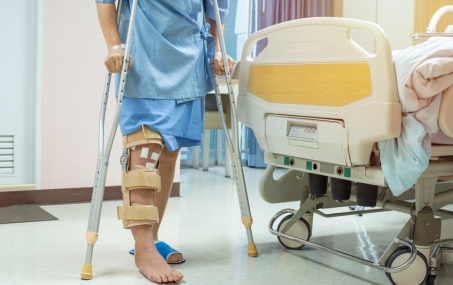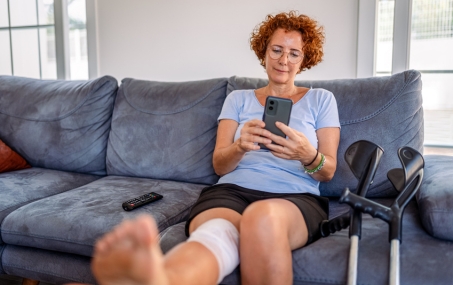As your Surgeon will likely explain, getting the best outcome from your joint replacement will begin before you’re admitted for your surgery.
The first step of preparing for a joint replacement, like any planned hospital admission, is to understand as much as you can about your procedure; from preparation to recovery, any risks involved and the procedure itself.
Speak with your surgeon about any pre-habilitation that you can do to improve your surgery outcomes, these might include physiotherapy and things that have an impact on your overall health like maintaining a healthy body weight and reviewing your current medications with your doctor. The stronger, healthier and fitter you are, the quicker your recovery may be.
It’s also important to prepare for returning home following your surgery, especially if you’re having a knee or hip replacement. Things like moving furniture and removing tripping hazards so it’s easier to get around with walking aids, deciding where you’ll sleep so you can avoid stairs, having comfortable clothes handy and speaking with your surgeon about aids to recovery such as toilet seat raisers and handrails.
Phoenix Health offers a range of Health Support Programs included with your hospital cover, including programs to support your rehab at home. To find out if you may be eligible, contact the Phoenix Health team.
Planning ahead with things like meals, cleaning, grocery shopping, etc. can make your recovery easier or ask a friend or family member in advance if they’ll be able to help you while you’re in your early stages of recovery.
There’s so much to think about when you’re planning to go to hospital… to help make life that little bit easier, we’ve put together the following list of things to remember to pack:
- Your Medicare card
- Your Phoenix Health member card
- Your medications – in their original containers if possible. (The nursing staff will ask you for them when you’re admitted, so they can give them to you during your stay.)
- Any x-rays or results from scans and tests you’ve had prior to admission
- Any paperwork the hospital may have given you to complete
- Your glasses
- Toiletries
- Mobile phone and charger
- Wear comfortable clothes and shoes
- Any other personal items to keep you entertained
| What not to take to hospital… make sure you leave any valuables, including jewellery at home. Hospitals are a safe place but there may not be anywhere for you to lock up valuables when you’re not in your room. |
You can find this checklist along with more tips in our downloadable guide here.
No two hospital admissions or procedures will be exactly the same but there are some commonalities that you can expect.
- You will need to pay any Excess applicable to your Phoenix Health hospital cover on admission and may be asked to sign a consent form for your procedure to go ahead.
- Before your surgery you will be seen by your anaesthetist to discuss your surgery and also likely see a physiotherapist who will explain your post-surgery program. If you need any scans or tests, they’ll be done now. You may also be given additional medication and asked about any medication you’re currently taking.
- After your surgery you’ll be monitored in a recovery ward before returning to your room to recuperate. You may have an IV drip, but the doctors and nurses will make you aware of this.
- Often after joint replacements patients are encouraged to get up and move quite quickly and your surgeon and nurses will guide you on your steps to recovery and rehabilitation in hospital.
- Unless there are complicating factors, we find many members can go home within a few days of a joint replacement.







